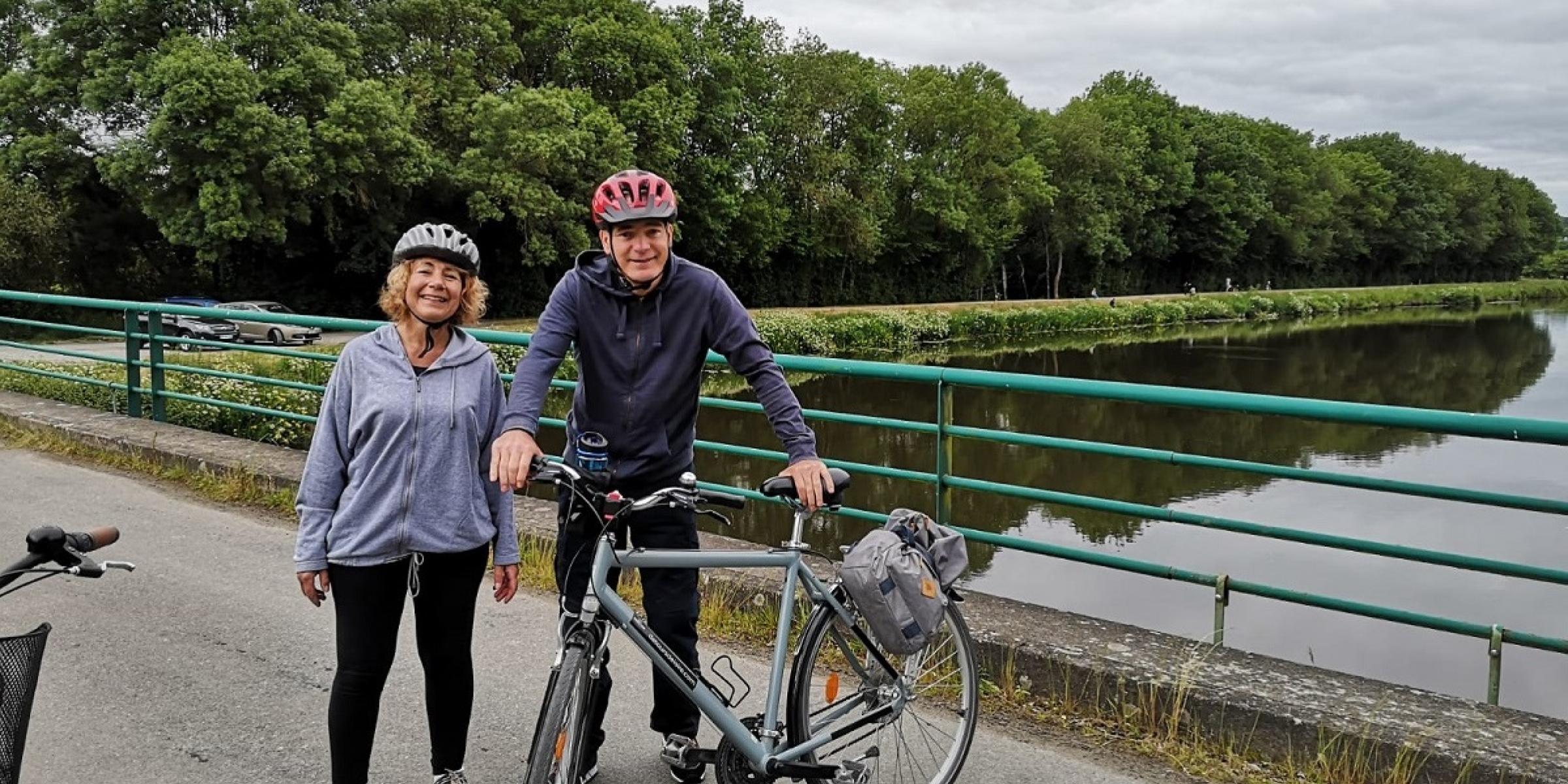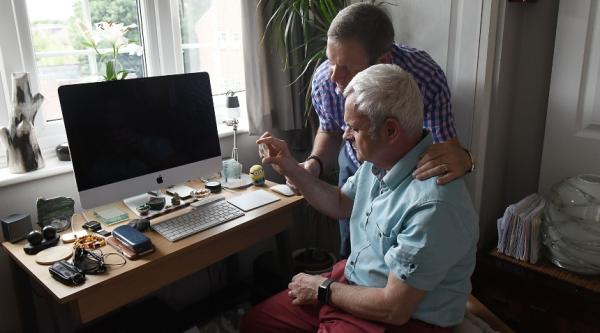
Real stories
Needing support as a young carer during coronavirus - Susanne's story
For Susanne and her husband David, who lives with mixed dementia, coronavirus has brought a stop to their busy routine. This has been hard on them both, and Susanne says the Government must not ignore people affected by dementia if lockdown measures return.
Susanne’s husband David was diagnosed with mixed dementia four years ago, when he was 60. Although David retired from teaching before his diagnosis, Susanne continued to work part-time.
They are both normally very active, and love going for walks and trips with their local Younger Onset Dementia group in Norfolk. David also attends a day care centre, which organises trips and activities, to make sure he stays active.
Since coronavirus, however, these activities and support have all had to stop.
‘It has gone from a full programme of events for everyone to nothing, almost overnight’ says Susanne.
With the day care facilities closed, and visits with the Young Onset dementia group stopped, Susanne was left caring for David 24/7 with no respite.
This recent period has been very stressful for both Susanne and David. Particularly with lockdown measures in place that may be difficult for people living with dementia to understand and stick to.
Susanne has struggled to go to the shops and queue to get in, as she cannot leave David at home. He finds social distancing difficult to understand.
Frustrated feelings
‘The perception is that people living with dementia sit in a chair and stare into space,’ says Susanne, ‘but this is far from the case with David.’
‘He is fit and active – he wants to get out and do stuff and doesn’t understand why he can’t do the things he normally does.
'If I can’t provide constant attention and entertainment, he quickly becomes bored, frustrated and argumentative.’
The Younger Onset Dementia group that Susanne and David are part of have been trying to keep up social contact virtually. But it can be very difficult for the people living with dementia in the group to take part in this, and it is nowhere near the extent of social contact the group had before coronavirus.
Worsening symptoms
The group have also noticed deterioration in some of the symptoms of dementia. Many believe these have been made worse as a result of the lockdown and lack of social contact.
According to Susanne, David’s behaviour has become more repetitive. He continually opens and shuts the front door, paces and takes things apart in the house for something to do.
Susanne has had to call the police once since lockdown began, when he wandered off on a walk. This almost happened on another occasion when he left the house because he wanted to be active, and did not understand the lockdown rules.
Susanne had no support to deal with this throughout lockdown, until David’s day care centre recently reopened.
Help required
Susanne feels it would have made a massive difference to see the Government recognise the huge role unpaid carers have played throughout lockdown.
'It has been very lonely for me,’ says Susanne. ‘My husband can’t hold a conversation, and will often go off in another direction, veer into the middle of the road or walk into people if we go for a stroll.
‘When the Government have been talking about people on their own being lonely, and making considerations for them, I feel that we have been forgotten. ‘
‘I would like to see explicit guidance for carers and those with dementia, should restrictions be reintroduced, or should any of us have to quarantine. We need to be able to get support from professional care providers, or family and friends when necessary, without the risk of infringing lockdown rules.
‘There is also the issue of things like PPE to consider. As far as family carers go, we should have access to same concessions as care workers during this time of crisis. We are caring 24/7, and yet are not being considered by the Government.
‘There seems to be an assumption that friends and family will magically appear from somewhere. But everyone is in the same position and there is no one to help – telephone services are not the answer!'
Join our coronavirus campaign
We are doing all we can to influence the Government, so their next steps consider the needs of people affected by dementia. We can’t do this without you – please join our campaign today.



Jane Spooner
saysI totally understand Susanne's situation as i too am in a similar one. Lockdown meant we lost all the social activities. These are likely to be the last thongs to resume, and some might not at all. And now with masks requited for public transport and in shops, that rules us out- my husband does not understand masks and takes it off.
Michael Wood
saysI learnt a long time ago that Politicians speak with Forked Tongue. Sadly because of that awareness I also know that unless circumstances directly affect them be it personally or politically nothing changes. I don't believe I am a pessimist but a realist.
These stories are so very sad and believe me I could tell my own story but I have come to accept that you really are alone in circumstances such as we are in at the moment. Those that comment here really are or have been at the end of their tether to feel the need to write.
Patricia SPENCER
saysMy husband is in the latter stages of Alzheimers. I care for him on my own 24/7. He rarely speaks and if he does, there is little sense. His mibilty has deteriorated significantly during the lock down and he is now in a wheelchair. If I go out he has to come, I cant leave him onhis own. He doesnt understand queuing so I wrote to Sainsburys, The store manager kindly gave me a letter to show the member of staff supervising the queue - it allows my husband and myself immediate access. Common sense prevailed and I'm exremelt grateful to JS.
The last 18 weeks have been the most stressful oeriod Ihave ever known. Come on Boris what about the home carers, we need support. I was quoted £530/month for my husband to have someone sit with him 4 hours a week so I could play golf with friends. Sorry but that's way too expensive so I'll carry on 24/7 till I eventually crack.
Jane Alexander
saysMy husband has dementia or Alzheimer’s from a TBI 12 years ago. He lives in Assisted Living and had been doing pretty well until the lockdown. He had declined so much and I don’t know if this is the end stage or what. He doesn’t want to eat and has lost a significant amount of weight since this started. He is also in a delusional state most of the time now. What does this mean? What should I expect? I am there every day and he knows me but talks about all the things he believes he is seeing and hearing. He seems to be living in an alternative world. This happened so quickly and I wasn’t expecting it. I do believe his decline has something to do with the Covid 19 shutdown. So unfair to all of these people.
Anonymous
saysHello Jane,
Thank you for getting in touch.
Unfortunately we have heard so many upsetting stories like this. We are very sorry that families like yours are having to go through this.
Please know that we're here for you, and you can call our Dementia Connect support line on 0333 150 3456. A trained dementia adviser can listen to you and give ideas, advice and support. You can read more about the support line (including opening hours) here: https://www.alzheimers.org.uk/get-support/dementia-connect-support-line
Hope this is helpful, Jane.
-
Alzheimer's Society blog team
Susan
saysI am also my mother’s carer, and she is also 93 years old. Just as lockdown started so I noticed that she seemed to be suffering from dementia like symptoms. It took from March to late June before our Doctors felt that she should be referred to the memory clinic, but due to Covid 19 we have recently been told this will not happen for 12 and more weeks before an appointment could come through. So I live with my mother as her carer 24/7 and was advised by adult social services, that due to COVID 19 there was a lot of others out there who needed help. If it was not for my sisters who keep in contact via a phone I don’t know what I would have done during these months. As I explain to my mother there is no guidebook for cadets of Dementia sufferers.
oya
saysI am the primary carer for my dad who has Alzheimer’s. As I work full time, we have a daily carer who helps with daily routines like bathing, eating, toilet facilities, etc. Since the beginning of coronovirus pandemic, our carer can not visit us anymore and I help my dad with the daily activities. Now, I work from home but it is very hard to arrange the online meetings, responsibilities regarding my work, plus daily care of my dad, shopping and other housework. Before the pandemic we could go daily walks in the park and my dad could walk independently. Since the lockdown measures have been introduced, we couldn’t go out for walks so his physical ability declined significantly. I have isolated myself from all social activities during this period, but I can not even thing about my own mental wellbeing and my social needs. My only wish during this period is to keep my dad safe and keep him as active as possible at home. I can not even imagine how hard would it be if we catch the coronovirus.
Jane Chew
saysI care for my 93 year old mother who has Alzheimer’s 24/7 and I can honestly say lockdown had been one of the toughest experiences of my life. Not being able to see family and friends to provide a little respite and light relief has almost finished me.
I have finally arranged for a local authority carer to come for 3 hours tomorrow. I will have to pay £60 for the privilege.
Anonymous
saysHi Jane, we're really sorry to hear this. It sounds really difficult for you at the moment.
Please remember you can talk to a dementia adviser for advice and support, whenever you need it. They may be able to provide some ideas or ways to give yourself more respite and relief.
Call the Dementia Connect support line on 0333 150 3456 or email [email protected].
https://www.alzheimers.org.uk/get-support/national-dementia-helpline
Hope this helps, Jane.
Alzheimer's Society blog team
Wendy
saysI also felt very lonely my husband has Parkinson's dementia and is unable to do most things I was able to go out and meet others He went to day care and I had sitters until lock down I still feel left behind has my husband is worse now